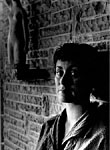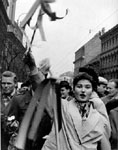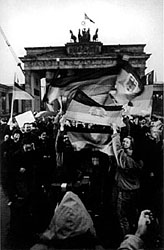 Recollecting
a Culture is the culmination of nearly two decades of work with
photographers from the former Soviet Union and Eastern Europe. During
that time, I have worked almost exclusively with artists operating
at the fringe of so-called "official" socialist culture.
From the start, the idea of official versus unofficial cultures fit
neatly into my conception of how contemporary art must exist in relation
to socialism, and had to be shot down regularly by artists, editors,
curators, and other administrators whose work, when properly presented
and understood, told a much more complicated story. In fact, cultural
workers in Eastern Europe did not occupy a zone of such black and
white clarity as the terms official and unofficial (dissident vs.
compliant) describe. Rather, they worked within a context of utter
instability. In East Germany especially, this instability was sustained
by an extraordinary level of bureaucracy, which transformed the terror
of observation and control into banalities of everyday life.
Recollecting
a Culture is the culmination of nearly two decades of work with
photographers from the former Soviet Union and Eastern Europe. During
that time, I have worked almost exclusively with artists operating
at the fringe of so-called "official" socialist culture.
From the start, the idea of official versus unofficial cultures fit
neatly into my conception of how contemporary art must exist in relation
to socialism, and had to be shot down regularly by artists, editors,
curators, and other administrators whose work, when properly presented
and understood, told a much more complicated story. In fact, cultural
workers in Eastern Europe did not occupy a zone of such black and
white clarity as the terms official and unofficial (dissident vs.
compliant) describe. Rather, they worked within a context of utter
instability. In East Germany especially, this instability was sustained
by an extraordinary level of bureaucracy, which transformed the terror
of observation and control into banalities of everyday life. By the late 1980s, East Germany had become the society that Guy Debord
described when he wrote that "totalitarian bureaucratic society
lives in a perpetual present in which everything that has happened
earlier exists for it solely as a space accessible to its police."
(Debord 1967, p. 75)
By the late 1980s, East Germany had become the society that Guy Debord
described when he wrote that "totalitarian bureaucratic society
lives in a perpetual present in which everything that has happened
earlier exists for it solely as a space accessible to its police."
(Debord 1967, p. 75)
In
no other circumstance have I ever seen the demand for truth so completely
at odds with its result as in the art of East Germany. Recognizing
this inherent contradiction, in the 1980s, East German photographers
joined with artists, journalists, writers, and others throughout Eastern
Europe and the Soviet Union seeking to redefine their cultures in
their own terms.  Whether
traditional or experimental in approach, the goals of the last generation
of East German artists were consistent with the goals of the first:
to truthfully and realistically portray the socialist transformation
of the German Democratic Republic. That they accomplished their goal,
and in so doing contributed significantly to the transformation of
late 20th century Europe, is a testament to the continuing
power of photography to inform, to challenge, and to inspire.
Whether
traditional or experimental in approach, the goals of the last generation
of East German artists were consistent with the goals of the first:
to truthfully and realistically portray the socialist transformation
of the German Democratic Republic. That they accomplished their goal,
and in so doing contributed significantly to the transformation of
late 20th century Europe, is a testament to the continuing
power of photography to inform, to challenge, and to inspire.
John
P. Jacob
Boston,
1998

 Recollecting
a Culture is the culmination of nearly two decades of work with
photographers from the former Soviet Union and Eastern Europe. During
that time, I have worked almost exclusively with artists operating
at the fringe of so-called "official" socialist culture.
From the start, the idea of official versus unofficial cultures fit
neatly into my conception of how contemporary art must exist in relation
to socialism, and had to be shot down regularly by artists, editors,
curators, and other administrators whose work, when properly presented
and understood, told a much more complicated story. In fact, cultural
workers in Eastern Europe did not occupy a zone of such black and
white clarity as the terms official and unofficial (dissident vs.
compliant) describe. Rather, they worked within a context of utter
instability. In East Germany especially, this instability was sustained
by an extraordinary level of bureaucracy, which transformed the terror
of observation and control into banalities of everyday life.
Recollecting
a Culture is the culmination of nearly two decades of work with
photographers from the former Soviet Union and Eastern Europe. During
that time, I have worked almost exclusively with artists operating
at the fringe of so-called "official" socialist culture.
From the start, the idea of official versus unofficial cultures fit
neatly into my conception of how contemporary art must exist in relation
to socialism, and had to be shot down regularly by artists, editors,
curators, and other administrators whose work, when properly presented
and understood, told a much more complicated story. In fact, cultural
workers in Eastern Europe did not occupy a zone of such black and
white clarity as the terms official and unofficial (dissident vs.
compliant) describe. Rather, they worked within a context of utter
instability. In East Germany especially, this instability was sustained
by an extraordinary level of bureaucracy, which transformed the terror
of observation and control into banalities of everyday life. By the late 1980s, East Germany had become the society that Guy Debord
described when he wrote that "totalitarian bureaucratic society
lives in a perpetual present in which everything that has happened
earlier exists for it solely as a space accessible to its police."
(Debord 1967, p. 75)
By the late 1980s, East Germany had become the society that Guy Debord
described when he wrote that "totalitarian bureaucratic society
lives in a perpetual present in which everything that has happened
earlier exists for it solely as a space accessible to its police."
(Debord 1967, p. 75)
 Whether
traditional or experimental in approach, the goals of the last generation
of East German artists were consistent with the goals of the first:
to truthfully and realistically portray the socialist transformation
of the German Democratic Republic. That they accomplished their goal,
and in so doing contributed significantly to the transformation of
late 20th century Europe, is a testament to the continuing
power of photography to inform, to challenge, and to inspire.
Whether
traditional or experimental in approach, the goals of the last generation
of East German artists were consistent with the goals of the first:
to truthfully and realistically portray the socialist transformation
of the German Democratic Republic. That they accomplished their goal,
and in so doing contributed significantly to the transformation of
late 20th century Europe, is a testament to the continuing
power of photography to inform, to challenge, and to inspire.